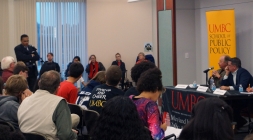
Photo by Carrie Cook for the Retriever
Students, professors and community members alike turned up in large numbers to the Post-Election Forum — a space to hear various perspectives on the future of our country the night after a historically divisive election.
It consisted of a panel of experts including John Fritze, a writer from the Baltimore Sun; Tom Schaller, Professor and Chair of the Department of Political Science; and Donald Norris, Professor and Director of the School of Public Policy. The three men each gave a brief lecture, offering their thoughts on the election and its implications for our country.
The event, held on Wednesday evening, drew a full crowd to the seventh floor of the Albin O. Kuhn Library. It was delayed several minutes while event organizers set up additional chairs. Even after more seating became available, there were still several dozen spectators standing at the back of the room. The event, which drew a crowd, was co-sponsored by the School of Public Policy, the Department of Political Science and the Maryland Institute for Policy Analysis and Research.
“Trump rewrote the playbook for running a campaign.”
Fritze described three conclusions he drew from this election. The first is that Trump overhauled the standards for running a campaign. The success of the campaign, Fritze argued, was not determined by its organization and professionalism. Second, this election disproved the theory that Republicans cannot win without expanding their base. Non-college-educated white men, especially “blue-collar” workers, turned up in droves to the polls to support Trump and propelled him to success. Finally, the results of this election solidified Maryland’s reputation as a heavily Democratic state. Its liberal leanings were called in to question following the election of Republican Governor Larry Hogan in 2014; many speculated that the state was becoming more bipartisan or turning “purple.” However, Clinton won Maryland with over 60 percent of the state’s votes, solidifying Maryland’s place as a Democratic stronghold.
“Negative views of both party nominees were historically high throughout the campaign.”
Schaller noted the significance of not just one, but both parties nominating the least-liked candidate in their respective primary fields. Negative views of both party nominees were historically high throughout the campaign. He also discussed the powerful gender dimension of this election, noting that it may outweigh the impact of even the race dimension. Finally, he pointed out Trump’s inconsistencies with typical conservative ideology, such as his promise to not alter spending on Social Security and Medicare, and his aversion to the traditional conservative view of free trade. These positions, Schaller argued, broke apart the Republican party and created a unique coalition of people from various political leanings, which helped him win the election.
“Everyone missed Donald Trump from the get-go.”
Norris noted the unorthodoxy of Trump as a candidate and a politician, even for industry experts: “Everyone missed Donald Trump from the get-go,” he said. Similarly, Trump’s victory shocked many experts in the field, including Nate Silver, a statistician who gave Clinton a 74 percent chance of victory at 4:00 on Tuesday. Norris also discussed the unpopularity of both candidates, hypothesizing that any other Democrat in the field would have beaten Trump “like a drum,” and any other Republican (besides Ted Cruz, perhaps) would have easily triumphed over Clinton.
Following presentations by all three experts, the floor opened for questions. The first was from UMBC President Freeman Hrabowski. He asked how educators can support young people, particularly women, who feel disenfranchised by the president-elect’s divisive rhetoric. After a brief discussion, dozens of students lined up at the microphones to ask questions to the presenters. Their inquiries ranged from the election’s implications for minority groups, to factors that influenced the shocking result. There were so many waiting to ask questions that Norris acted as a moderator, ensuring that the questions were short and each student only asked one question.
Some of the questions raised tensions in the room. Schaller and Norris offered a pessimistic view of the country’s future, citing Trump’s inexperience, unprofessional campaign and polarizing remarks. Following their answer to a student’s question, Hrabowski challenged the men to create a more positive perspective on the situation.
“Give my students hope.”
“Give my students hope,” he said. Hrabowski’s plea went largely unanswered as the men continued to discuss the historical inexperience of Trump and his blatant ignorance surrounding many key policy issues.
Many students shared their pessimism while also feeling called to action due to the turbulent events of this election season. “Beyond the worry of what might happen, I feel a certainty of what WILL happen — ” said senior American studies and political science major Richard Elliott. “We will make sure nothing like this ever happens again.”
The post Experts offer bleak outlook at Post-Election Forum appeared first on The Retriever.





